Related Research Articles

British Honduras was a British Crown colony on the east coast of Central America, south of Mexico, from 1783 to 1964, then a self-governing colony, renamed Belize in June 1973, until September 1981, when it gained full independence as Belize. British Honduras was the last continental possession of the United Kingdom in the Americas.
High commissioner is the title of various high-ranking, special executive positions held by a commission of appointment.

Northern Rhodesia was a British protectorate in south central Africa, now the independent country of Zambia. It was formed in 1911 by amalgamating the two earlier protectorates of Barotziland-North-Western Rhodesia and North-Eastern Rhodesia. It was initially administered, as were the two earlier protectorates, by the British South Africa Company (BSAC), a chartered company, on behalf of the British Government. From 1924, it was administered by the British Government as a protectorate, under similar conditions to other British-administered protectorates, and the special provisions required when it was administered by BSAC were terminated.
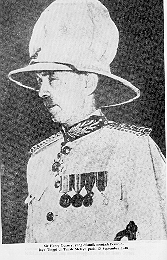
Sir Henry Lovell Goldsworthy Gurney was a British colonial administrator who served in various posts throughout the British Empire. Gurney was killed by communist insurgents during the Malayan Emergency, while serving as high commissioner in the Federation of Malaya.

Sir Andrew Caldecott was a British colonial administrator.

Douglas Hewitt Hacking, 1st Baron Hacking was a British Conservative politician.
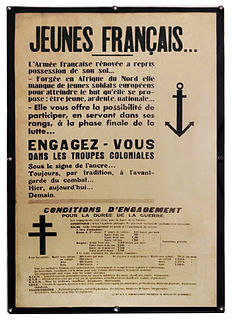
Colonial troops or colonial army refers to various military units recruited from, or used as garrison troops in, colonial territories.
Sir Percy Wyn-HarrisKCMG MBE KStJ was an English mountaineer, colonial administrator, and yachtsman. He worked in the Colonial Service in Africa and served as Governor of the Gambia from 1949 to 1958.

Sir John Henry Birchenough, 1st Baronet, was an English businessman and public servant.
Sir Ronald Herbert Garvey was a British Colonial Service administrator who served in the Pacific, the West Indies, and as Lieutenant Governor of the Isle of Man at the end of his career.
The Colonial Service, also known as His/Her Majesty's Colonial Service and replaced in 1954 by Her Majesty's Overseas Civil Service (HMOCS), was the British government service that administered most of Britain's overseas possessions, under the authority of the Secretary of State for the Colonies and the Colonial Office in London. It did not operate in British India, where the same function was delivered by the Indian Civil Service, nor in the Anglo-Egyptian Sudan, which was administered by the Sudan Political Service, nor in the internally self-governing colony of Southern Rhodesia.
Captain Monrad Sigfrid Metzgen, was a politician in the Colony of British Honduras.

The Royal Corps Of Eritrean Colonial Troops were indigenous soldiers from Eritrea, who were enrolled as askaris in the Royal Corps of Colonial Troops of the Royal Italian Army during the period 1889–1941.
The Northern Rhodesia Police was the police force of the British-ruled protectorate of Northern Rhodesia.
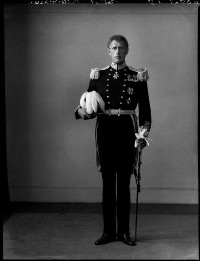
Sir Harold Baxter Kittermaster, KCMG, KBE was governor of British Somaliland, British Honduras, and then of the Nyasaland protectorate in the period before the Second World War.
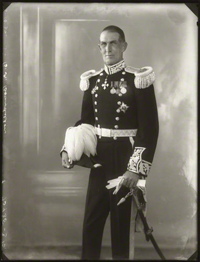
Sir Bernard Henry Bourdillon (1883–1948) was a British colonial administrator who was Governor of Uganda (1932–1935) and of Nigeria (1935–1943).
Sir Joseph William Bhore was an Indian civil servant and diwan of the Cochin State. He is best remembered for his chairmanship of the Health Survey and Development Committee that charted a course for public health investments and infrastructure in India.

The Chief Commissioner's Province of Aden was the administrative status under which the former Aden Settlement (1839–1932) was placed from 1932 to 1937. Under that new status, the Viceroy of India assumed direct control over Aden, which had hitherto been administered by the government of the Bombay Presidency. The Aden Protectorate remained unaffected by this change.
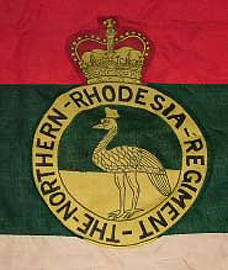
The Northern Rhodesia Regiment (NRR) was a multi-battalion British colonial regiment raised from the protectorate of Northern Rhodesia. It was formed in 1933 from elements of the Northern Rhodesia Police, which had been formed during Company rule in 1912. Made up of black other ranks and white officers, its motto was "Different in Race, Equal in Fidelity". This motto may have been adopted following native African porters during the First World War being recognised and compensated as couriers by the British.

The District Officer, was a commissioned officer of one of the colonial governments of the British Empire, from the mid-1930s also a member of the Colonial Service of the United Kingdom, who was responsible for a District of one of the overseas territories of the Empire.
References
- ↑ "Official Notices to Members". Flight International. XXIV (19, 6 May 1932). 1932.
- 1 2 Epstein, Arnold Leonard (1958). Politics in an Urban African Community . Manchester: Manchester University Press. p. 87. ISBN 9780719010415.
Keith Ndola District Commissioner 1935.
- ↑ Forbes, Angela (2015). The British Empire and the War Effort: A Comparative Study of the Experiences of the British Honduran Forestry Unit and the Newfoundland Overseas Forestry Unit (PDF). Inverness: University of the Highlands and Islands.